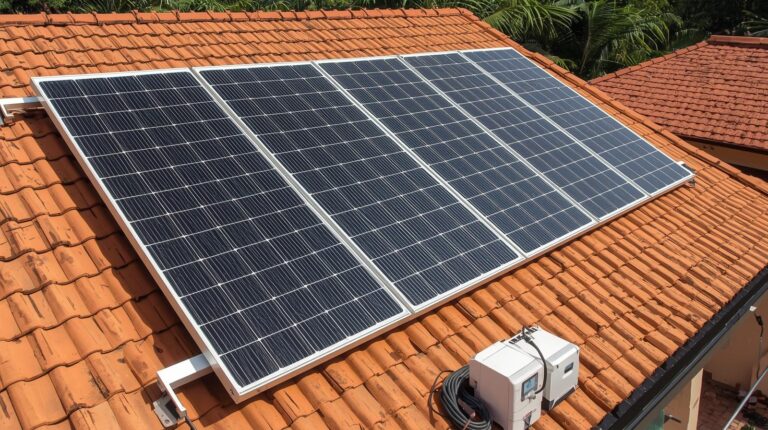Welcome to our article on ‘Revolutionary Solar Panels: The Future of Clean Energy.’ We’re about to take you on a journey into the world of solar panels, where we’ll explore their composition, manufacturing process, and incredible benefits.
Imagine powering your home with the sun’s rays, reducing your carbon footprint, and saving money in the process. Sounds pretty amazing, right? Well, get ready to dive into the technical details and discover the immense potential of these revolutionary solar panels. Let’s get started!
History of Solar Panels
We have witnessed significant advancements in the history of solar panels, revolutionizing the way we harness clean energy. The manufacturing process of solar panels has evolved over time, with a focus on improving efficiency and sustainability.
In the early days, solar panels were made by arranging solar cells on a single back sheet. These cells were coated with silicon nitride and roughed up to increase sunlight absorption. As technology progressed, the cells underwent phosphorus and boron treatment to create a one-way semiconductor capable of conducting electricity.
Future trends in solar panel technology include the use of alternative materials, such as perovskite, to enhance efficiency and reduce costs. Additionally, advancements in nanotechnology may lead to the development of flexible and lightweight solar panels, opening up new possibilities for integration into various structures and devices.
The history of solar panel manufacturing shows that continuous innovation and research will shape the future of clean energy.
Advancements in Solar Panel Technology
Advancements in solar panel technology have revolutionized the way we harness clean energy. These improvements in solar panel efficiency and material advancements have brought us closer to a sustainable future. Here are three key advancements that are shaping the solar panel industry:
- Increased Efficiency: Solar panels today are more efficient than ever before. With advancements in cell design and manufacturing processes, panels can convert more sunlight into electricity, maximizing energy generation.
- Next-Generation Materials: Researchers are constantly exploring new materials that can enhance solar panel performance. From thin-film solar cells to perovskite-based panels, these advancements are pushing the boundaries of what’s possible in solar energy production.
- Flexible and Lightweight Panels: Traditional solar panels are bulky and rigid, limiting their applications. However, recent advancements have led to the development of flexible and lightweight panels that can be integrated into various surfaces, like roofs and even clothing.
With these advancements, the future of solar energy looks bright, both literally and figuratively. It’s exciting to see how technology continues to evolve, bringing us closer to a sustainable and clean energy future.
Related Post: The Best Books on Solar Energy: Top 20 Best Picks.
Efficiency and Performance of Solar Panels
The efficiency and performance of solar panels can greatly impact the generation of clean energy. Improving the efficiency of solar panels is essential for maximizing energy production and reducing costs.
One way to achieve efficiency improvements is through regular solar panel maintenance. This includes cleaning the panels to remove dirt, dust, and debris that can reduce their effectiveness in absorbing sunlight. Additionally, inspecting for any damage, such as cracks or breakage, and promptly repairing or replacing faulty panels can ensure optimal performance. Regular maintenance also involves checking the wiring connections and monitoring the performance of the panels to detect any potential issues.
By investing in proper maintenance, solar panel owners can ensure that their panels are operating at peak efficiency, leading to increased clean energy generation and long-term cost savings.
Environmental Benefits of Solar Panels
One of the most significant advantages of solar panels is their positive impact on the environment. Here are three environmental benefits of solar panels:
Carbon footprint reduction
Solar panels produce clean and renewable energy by converting sunlight into electricity. This means that using solar panels significantly reduces the reliance on fossil fuels, which are major contributors to carbon emissions. By switching to solar energy, we can reduce our carbon footprint and contribute to the fight against climate change.
Environmental sustainability
Solar panels are a sustainable source of energy. Unlike traditional sources like coal or natural gas, solar power is renewable and abundant. By harnessing the power of the sun, we can generate electricity without depleting natural resources or causing harm to the environment. Solar panels also have a longer lifespan, which reduces the need for frequent replacements and minimizes waste.
Reduced air and water pollution
Solar energy production doesn’t release harmful pollutants into the air or water. Unlike fossil fuel power plants, solar panels don’t emit greenhouse gases, sulfur dioxide, or nitrogen oxide, which contribute to air pollution and respiratory diseases. Additionally, solar panels don’t require water for their operation, reducing the strain on water resources and minimizing water pollution.
Applications of Solar Panels
Harnessing the environmental benefits of solar panels, we can explore the diverse applications of this clean energy technology. Solar panels have proven to be versatile and efficient, making them ideal for a wide range of uses, including agriculture.
In the agricultural sector, solar panels can be used to power irrigation systems, lighting for greenhouses, and electric fences. By utilizing solar energy, farmers can reduce their reliance on fossil fuels and lower their operating costs.
Furthermore, advancements in solar panel efficiency have made them even more appealing for agricultural applications. With improved efficiency, solar panels can generate more electricity from the same amount of sunlight, allowing for increased productivity and energy savings.
As solar panel technology continues to evolve, we can expect even greater advancements and expanded applications in the future.
The Economics of Solar Energy
To fully understand the economics of solar energy, we must analyze the cost-effectiveness and long-term benefits of adopting solar power. Here are three key points to consider:
- Cost Savings: While the initial investment in solar panels may seem daunting, the long-term savings are significant. Solar energy can significantly reduce or eliminate monthly electricity bills, saving homeowners and businesses thousands of dollars over the lifespan of the panels.
- Return on Investment: Investing in solar panels offers a high return on investment. The cost effectiveness of solar panels is evident in the fact that they can pay for themselves within a few years through energy savings. After that, the electricity generated is essentially free.
- Environmental Benefits: Solar energy isn’t only cost-effective but also environmentally friendly. By harnessing the power of the sun, solar panels reduce reliance on fossil fuels, resulting in reduced carbon emissions and a cleaner, greener future.
Challenges and Solutions in Solar Panel Manufacturing
While there are numerous challenges faced in solar panel manufacturing, we’ve found innovative solutions to overcome these obstacles.
One major challenge is improving solar panel efficiency. We’ve tackled this issue by implementing advanced manufacturing techniques and materials. For instance, we’re exploring the use of perovskite materials, which have the potential to greatly enhance solar cell efficiency.
Another challenge is reducing the cost of production. To address this, we’ve optimized our manufacturing processes to streamline operations and minimize waste. Additionally, we’re investing in research and development to find ways to lower the cost of raw materials without compromising quality.
Future Innovations in Solar Panel Technology
As we explore the future of solar panel technology, our focus turns to advancements in efficiency and sustainability. Here are three exciting innovations that hold promise for the future:
Solar Panel Efficiency Improvements
Researchers are constantly striving to increase the efficiency of solar panels, allowing them to convert more sunlight into electricity. From multi-junction cells that capture a broader spectrum of light to bifacial panels that can generate electricity from both the front and back sides, these advancements aim to maximize energy production.
Next Generation Solar Materials
Scientists are exploring new materials that can replace traditional silicon in solar cell manufacturing. These materials, such as perovskite and thin-film solar cells, offer the potential for higher efficiency and lower production costs. Additionally, they can be flexible and lightweight, opening up new possibilities for solar integration in various applications.
Energy Storage Integration
The future of solar panel technology goes beyond just generating electricity. Integrating energy storage systems, such as batteries, with solar panels allows for better utilization of the generated energy. This ensures a steady power supply even when the sun isn’t shining, making solar energy more reliable and accessible.
With these advancements on the horizon, the future of solar panels looks bright. More efficient and sustainable solar technology will propel us towards a cleaner, greener future.
Government Policies and Incentives for Solar Energy
Talking about Government Policies and Incentives for Solar Energy, we can see that numerous quantifiable benefits have emerged from the advancements in solar panel technology.
Government incentives and solar policies play a crucial role in promoting the adoption of solar energy. These policies often include tax credits, grants, and rebates that make solar energy more affordable and accessible. By incentivizing the use of solar panels, governments encourage individuals and businesses to invest in clean energy solutions, thereby reducing their carbon footprint and contributing to a more sustainable future.
Moreover, these policies stimulate economic growth by creating jobs in the solar industry. It’s important for governments to continue supporting solar energy through favorable policies to accelerate the transition to a clean energy future.
Choosing the Right Solar Panel Installation Company
When choosing the right solar panel installation company, we should consider their experience, customer reviews, and certifications.
Here are three reasons why professional installation is beneficial:
- Expertise: Professional installers have the knowledge and experience to ensure that your solar panels are installed correctly and efficiently. They understand the complexities of the installation process and can handle any challenges that may arise.
- Warranty: Many solar panel manufacturers require professional installation to maintain the warranty. By choosing a reputable installation company, you can ensure that your panels are installed according to the manufacturer’s guidelines, protecting your investment.
- Safety: Installing solar panels can be dangerous, especially if you don’t have the proper training and equipment. Professional installers follow strict safety protocols to ensure the installation is done safely and without any accidents.
While some may consider a DIY solar panel installation to save costs, the benefits of professional installation far outweigh the risks. It’s best to leave it to the experts and enjoy the peace of mind that comes with a professionally installed solar panel system.
Conclusion
The future of clean energy lies in the revolutionary solar panels. These panels have evolved significantly in recent years, offering increased efficiency and performance.
One fascinating statistic to consider is that the cost of solar panels has decreased by 99% since 1977, making them a more accessible and affordable option for individuals and businesses alike.
With their environmental benefits, versatility, and potential for innovation, solar panels are poised to play a crucial role in our transition to a sustainable and energy-efficient future.




